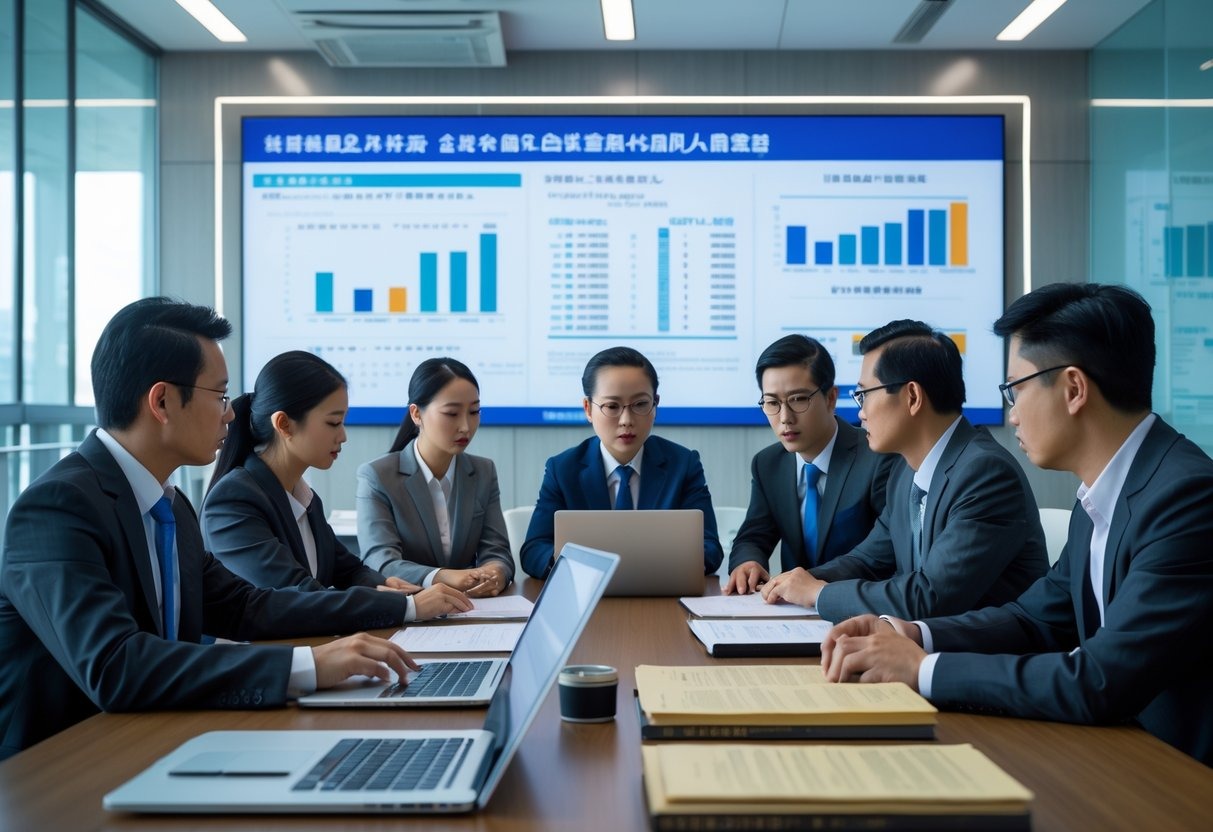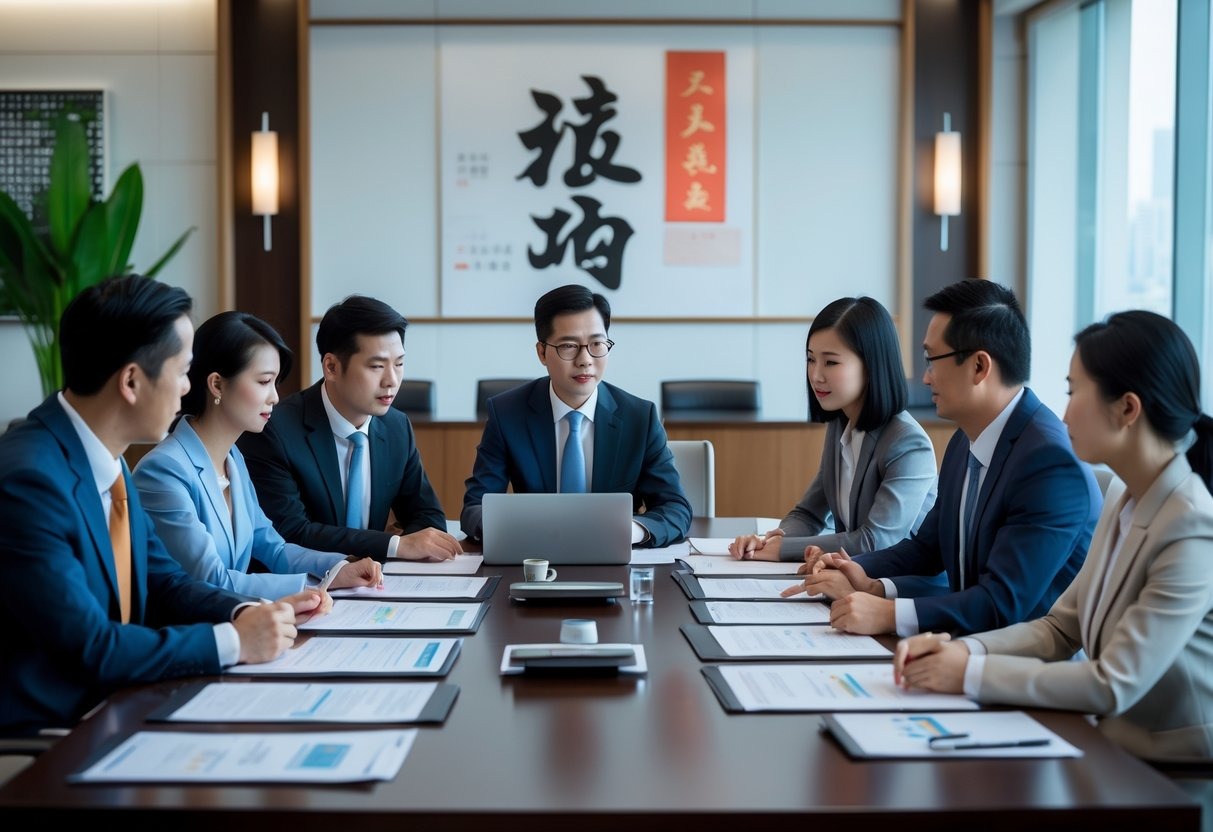Employment disputes in China can get complicated fast, especially with new judicial interpretations starting September 1, 2025. The Supreme People’s Court wants to unify labor law across regions and clarify things like non-compete clauses, contract rules, and compensation.
Understanding these changes is important if you want to protect your organization and keep up with China’s labor standards.
You’ll need to work through China’s system step by step: consultation, mediation, arbitration, and then litigation if needed. Each stage follows a set order, and skipping one can mess up your case or delay things.
Knowing how this process works saves you time and trouble.
Key Takeaways
- China’s labor dispute system uses a set process before you reach court.
- New 2025 rules clarify contract and compensation details.
- Staying compliant and preventing problems helps avoid workplace drama.
Start by reading our comprehensive guide, Dispute Resolution in China: An Overview to understand how arbitration and mediation shape labor dispute outcomes.
Understanding Employment Disputes in China

Most employment disputes in China come from arguments over contracts, pay, or work conditions. The legal system tries to protect both sides and keep labor relations steady.
Common Types of Employment Disputes
You’ll probably see a few main types of labor disputes in China.
- Wage and benefit disputes — fights about unpaid or underpaid wages, bonuses, or social insurance.
- Termination disputes — arguments over whether a firing was legal or if severance is owed.
- Contract disputes — problems with unsigned, expired, or badly written contracts.
- Working hours and leave disputes — disagreements about overtime, days off, or annual leave.
Non-compete and confidentiality fights pop up too, especially with skilled or higher-up employees. The Supreme People’s Court recently made the rules on non-competes and contract signing clearer.
Usually, these disputes go through consultation, mediation, arbitration, and litigation in that order. Arbitration is the main step before you can go to court.
Key Causes of Disputes
Most employment disputes in China start with contract misunderstandings and different expectations between workers and bosses. If job terms aren’t clear or there’s no written contract, people often fight over pay or duties.
The economy changes fast, and local rules aren’t always enforced the same way. Some bosses ignore labor laws, and some workers don’t know their rights.
Improper firing causes a lot of trouble. Bosses sometimes let people go without notice or proper pay, which leads to arbitration or court. Disputes about social insurance and unpaid overtime are common, especially in factories and service jobs.
Characteristics of Labor Disputes
Labor disputes in China have some clear features. You have to follow a four-step system: consultation, mediation, arbitration, then litigation. You can’t skip steps, and arbitration is required before you sue.
Most disputes involve one worker, but sometimes groups of workers get involved. Arbitration committees and courts try to solve things fast to keep the peace at work.
The Supreme People’s Court wants the law applied the same everywhere. They’ve updated the rules on figuring out employment relationships, non-competes, and pay for illegal firings.
Local arbitration commissions handle most cases. They want fair results and hope people settle, so things stay balanced in the workplace.
Legal Framework and Compliance

China’s employment system uses national laws, court rules, and local regulations to tell employers how to handle contracts, rights, and duties. You need to follow these closely or risk fines and contract problems.
Chinese Law Governing Employment
The Labor Law (1994) and Labor Contract Law (2008) are the main rules for jobs in China. They set the basics for pay, work hours, time off, and firing.
The Supreme People’s Court’s Interpretations, including the new one for 2025, explain how courts should handle disputes. National law always wins if local rules clash with it.
You also have to follow rules on social insurance, taxes, and safety. Foreign employers really need to know both national and local requirements, since missing something can mean penalties or lawsuits.
If there’s a dispute, you must go through labor arbitration before court. This gives both sides a chance to settle under official eyes.
Employment Contracts and Documentation
You need to sign a written contract within a month after hiring someone. The contract should say what the job is, how much you’ll pay, work hours, and how to end the job. If you don’t do this, you might have to pay double wages.
Non-compete agreements are allowed but limited. They usually cover senior staff or people who know company secrets. You have to pay them monthly during the non-compete, and the period can’t go past two years after they leave.
Keep all records, like payroll and attendance, for at least two years after someone leaves. These are your proof if there’s a dispute.
Employee Rights and Employer Obligations
Employees have the right to fair pay, rest days, social insurance, and safe work conditions. You must pay into five insurance funds: pension, medical, unemployment, work injury, and maternity.
Workers get paid annual leave, sick leave, and maternity or paternity leave. During sick leave, you pay a lower wage set by local rules, but it can’t be below the minimum.
You need a legal reason to fire someone, like misconduct or redundancy, and you must give written notice and pay severance if needed. If you fire someone illegally, you might have to hire them back or pay them extra.
Doing regular checks, keeping things transparent, and keeping good records help you avoid problems and keep your workplace stable.
To strengthen your workplace agreements, explore our article, Written vs. Oral Agreements in China: What You Must Know — it highlights how proper documentation can prevent conflicts before they start.
Resolution Mechanisms for Employment Disputes

You have to follow a set process to solve employment disputes in China. The system focuses on arbitration before litigation, with government and courts working together to keep things fair.
Labor Dispute Arbitration Process
You must file for labor dispute arbitration before you can go to court. That’s the law in China.
Local labor dispute arbitration committees handle most cases. These groups include people from labor authorities, unions, and employer groups. They try to settle things fast so you don’t need a trial.
Arbitration covers stuff like unpaid wages, firings, and workplace injuries. You usually have one year to file after you find out about the problem.
If both sides want, mediation can happen during arbitration. If you can’t settle, the committee gives an arbitral award, which is binding unless you appeal in time.
Role of the Supreme People’s Court (SPC)
The Supreme People’s Court (SPC) sets the rules for labor disputes nationwide. They publish cases and guidance so courts across China handle things the same way.
You can check out typical cases from the SPC to see how judges look at things like employment relationships or pay fights. The SPC also works with the Ministry of Human Resources and Social Security (MOHRSS) to make the system smoother.
Together, they push for transparency and fair enforcement. The SPC keeps an eye on local courts and arbitration groups to cut down on different results in similar cases and build public trust.
Court Proceedings and Appeals
If you don’t like the arbitration result, you can sue in a People’s Court within the deadline. The court checks if the arbitration followed the law.
Court cases focus on evidence and the law, not negotiation. You can show documents, bring witnesses, or use experts to help your case.
You can appeal if you think the court got it wrong. Higher courts review both the facts and the law.
The court process takes longer than arbitration, but it gives a final, enforceable decision. Courts work to protect everyone’s rights under Chinese labor law.
For business leaders handling HR challenges, read our in-depth resource, China Business Dispute Resolution: Strategies for Success to learn strategic approaches to resolving employment-related issues efficiently.
Best Practices for Preventing Employment Disputes

You can avoid a lot of labor disputes by using clear contracts, steady HR policies, and honest communication. If you pay attention to compliance, keep good records, and treat people fairly, you’ll have fewer problems.
Drafting Effective Employment Contracts
A solid contract spells out what you and your employees expect. It should cover job duties, pay, benefits, hours, and how to end the job, following Chinese law.
Use clear language so there’s no confusion. Add details about probation, confidentiality, and non-competes if needed. Make sure both sides sign before work starts—delays or unsigned contracts can lead to legal trouble.
Keep copies of every version and update. If your company operates in more than one region, check with the local labor bureau since rules can change from place to place.
Review contracts regularly to keep up with the law or company changes.
Updating HR Policies and Handbooks
Your HR policies and employee handbook guide workplace behavior and compliance. They need to match national and local labor rules, including the latest updates from the Supreme People’s Court.
Use plain, steady language so everyone knows their rights and duties. Cover things like attendance, leave, performance reviews, and what happens if someone breaks the rules.
Clear policies cut down on confusion and help make sure people get treated fairly. Look over your handbook every year or whenever the laws change.
Run training sessions to explain any updates. Make sure employees sign something to show they understand. If a labor dispute pops up, this paperwork can back you up.
Managing Workplace Relations
Good workplace relations stop a lot of problems before they turn into bigger fights. Encourage managers and employees to talk openly so you can spot issues early.
Teach supervisors about local labor rules and how to handle disputes through talking or mediation. These ways usually save time and money compared to going to court.
Try to build a culture where people respect each other and feel safe sharing feedback. Fix complaints fast and keep notes on what you’ve done. When folks trust your process, they’ll probably want to solve things inside the company instead of running to a lawyer.
Final Thoughts
Employment disputes in China can disrupt operations and damage workplace trust if not handled properly.
From contract drafting to arbitration, understanding the right legal steps is essential. Whether you’re managing compliance or handling termination issues, expert legal support ensures a fair and efficient resolution.
For personalized advice and professional representation, consult China Legal Experts — helping you navigate China’s complex employment laws with confidence.
And if you’re setting up contracts or policies, don’t miss our guide, Dispute Resolution Clauses That Work in China — it provides practical examples of clauses that can help avoid future labor disputes.
Frequently Asked Questions
What are the primary causes of employment disputes in China?
Most fights start over contract terms, unpaid wages, social insurance, or being fired for the wrong reasons.
Issues with overtime, severance, or changing job duties also cause trouble.
Having clear contracts and keeping good records lowers these risks.
How does the Chinese labor arbitration process work for resolving employment disputes?
You have to file your case with the local labor dispute arbitration committee first. Arbitration comes before you can go to court.
The committee looks at the evidence, listens to both sides, and makes a decision. If you don’t like the outcome, you can appeal in court.
What rights do employees have in China when facing unfair dismissal?
You can ask for written notice and a real reason for being let go. If the firing isn’t legal, you can ask to get your job back or get paid money instead.
Employers have to follow strict steps, like giving notice ahead of time or paying extra if they don’t.
What are the statutory time limits for filing an employment dispute in China?
You need to start most labor arbitration cases within one year of knowing your rights got violated. If you miss the deadline, you usually lose your chance to make a claim.
There are exceptions, like if the problem keeps happening, such as unpaid wages that go on and on.
How are employment contracts enforced in China in the case of a dispute?
Arbitration committees and courts look at written contracts, payroll, and attendance records as proof. If your boss doesn’t give you a written contract, you can ask for double wages for that time.
Both sides should keep good records to protect themselves. It’s just smart.
What role do labor unions play in employment disputes in China?
Labor unions stand up for employees during negotiations. They step in to smooth over conflicts before things get out of hand.
Unions help with mediation and make sure companies actually follow labor laws. They keep an eye on layoffs and firings, looking out for workers’ rights.
Subscribe to receive updates
Subscribe to receive the latest blog posts to your inbox every week.




.jpg)
.jpg)
.jpg)